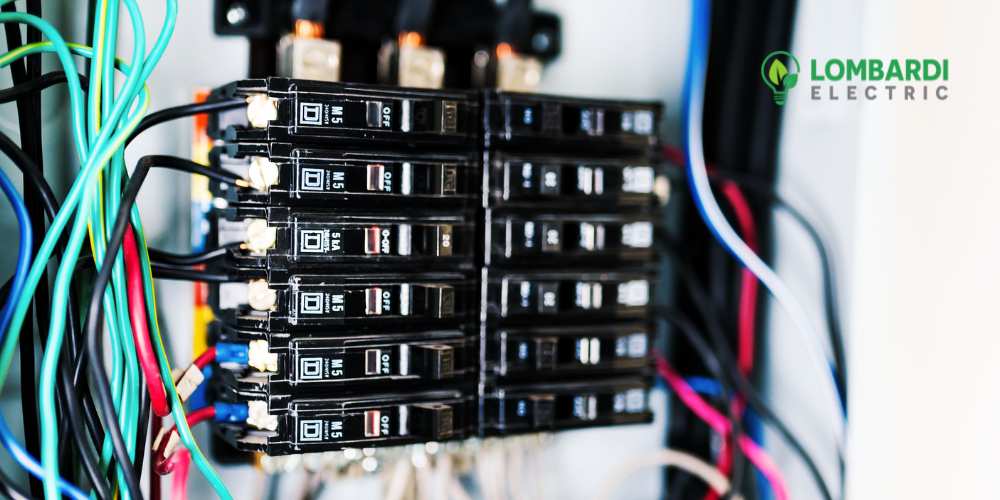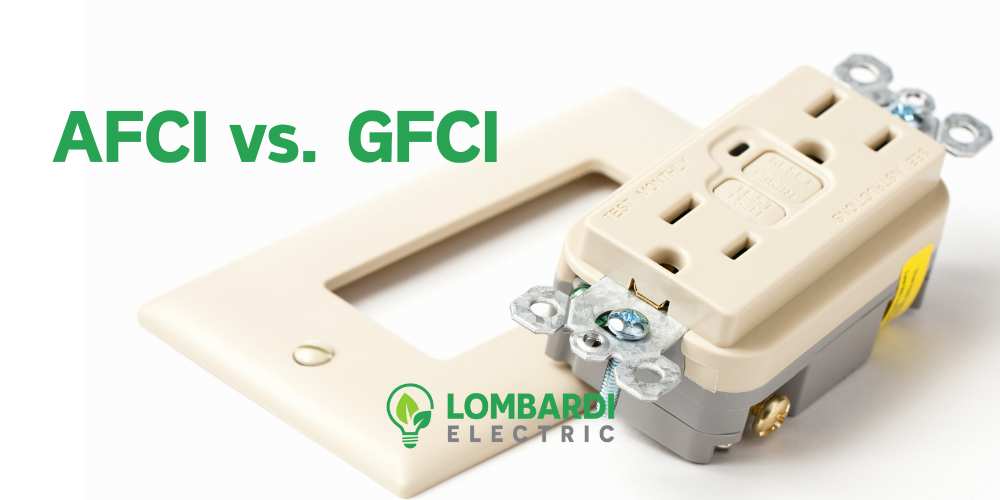Understanding the difference between Arc Fault Circuit Interrupters (AFCIs) and Ground Fault Circuit Interrupters (GFCIs) is crucial. An AFCI outlet is designed to prevent fires by detecting and interrupting dangerous electrical arc faults that can occur in faulty wiring and connections. On the other hand, a GFCI outlet protects against electric shock or electrocution by quickly shutting off power when a ground fault is detected. Both AFCI and GFCI outlets are vital for preventing electrical accidents. Below, Alexandria electricians at Lombardi Electric break down AFCI vs GFCI: what exactly these electrical circuit interrupters do, how ground and arc fault circuit interrupters work, what happens if electrical wires get wet, and why they are necessary for electrical safety.
Lombardi Electric provides top-notch Alexandria residential electrical services, Alexandria commercial electrical services, and Alexandria industrial electrical services. Call Lombardi Electric at 318-545-7575 to speak with one of our top-notch Alexandria electricians today and ensure your property is up to the standards of the National Electrical Code and equipped with both AFCI protection and GFCI protection.
What is a Ground Fault?
A ground fault occurs when electrical current strays outside its intended path, often due to damaged insulation or conductive materials coming into contact with electrical components. Ground faults can be hazardous as they may lead to electrical shock if a person becomes part of the path to the ground.
GFCI Protection

What Does GFCI Stand For?
GFCI stands for Ground-Fault Circuit Interrupter. This term describes a device that interrupts or cuts off the circuit when it detects that the electrical current is not flowing through its intended path, but instead is leaking towards the ground.
What is the Purpose of a Ground-Fault Circuit Interrupter (GFCI)?
The primary purpose of GFCI protection is to protect people from electrical shock by monitoring the amount of electrical current passing in a circuit and quickly shutting off the power if the GFCI breaker detects any imbalance. This imbalance would suggest a leakage current, possibly through a human body. GFCI protection is essential to prevent electrical shock in environments where any part of the electrical system could come into contact with water, such as in bathrooms, laundry rooms, and outdoor areas.
GFCI Outlet
A GFCI outlet is a specialized electrical outlet designed to protect against electrical shock from faults in the flow of electrical current. It features built-in circuitry that monitors the electrical current flow in a circuit. If the GFCI outlet detects any imbalance in the electrical current, indicating that electricity is flowing along an unintended path (such as through a person), it quickly cuts off the power to prevent injury. GFCI outlets are critical for protection in bathrooms, kitchens, laundry rooms, and outdoor areas.
GFCI Breaker
If a GFCI breaker detects that one electrical current exceeds the other, indicative of a leakage current, the GFCI breaker reacts within milliseconds to shut off the power, significantly reducing the risk of injury or death from electrical shock and electrocution. By installing GFCI outlets in high-risk areas, homeowners and businesses can ensure an essential layer of protection against one of the most common electrical hazards.
What is an Arc Fault?
An arc fault is a type of electrical problem that occurs when an electrical circuit veers off its intended path, often due to damaged or worn wires or loose connections creating a high-intensity electrical “arc.” These electrical faults generate excessive heat, which can ignite nearby flammable materials, leading to electrical fires. Parallel arcs are extremely dangerous, occurring between two conductors without a neutral conductor in between.
AFCI Protection

What is an Arc Fault Circuit Interrupter (AFCI)?
An Arc Fault Circuit Interrupter (AFCI) is an electrical safety device designed to detect a wide range of electrical arc faults and interrupt the circuit to prevent electrical fires. Unlike a standard circuit breaker that protects against overloads in the current flow and short circuits, an AFCI breaker provides enhanced protection against electric shocks by recognizing the unique current flow and noises associated with arcing and promptly shutting down the affected circuit before a fire can start.
Where are Arc-Fault Breakers Not Required?
Arc-fault breakers are not required in certain areas of a home or building where the National Electrical Code (NEC) does not mandate the devices installed. However, local codes may vary, and it’s important to consult current National Electrical Code guidelines or an electrical inspector to understand specific exemptions.
A commercial electrical inspector in Alexandria can let you know what will fail an electrical inspection.
Arc Fault Circuit Interrupters vs Ground Fault Circuit Interrupters
Arc Fault Circuit Interrupters (AFCIs) and Ground Fault Circuit Interrupters (GFCIs) serve crucial but distinct purposes in electrical safety.
AFCI devices are designed to prevent fires by detecting and interrupting arc faults, which are unwanted electrical discharges that can occur in faulty wiring or a loose connection. Arc faults can generate enough heat to ignite surrounding materials, posing a serious risk for electrical fires. AFCI protection through AFCI outlets is particularly useful in bedrooms and living rooms, where these types of electrical faults are more likely to occur due to wear and tear on electrical wiring.
GFCI devices prevent electrical shock by monitoring the electrical current flow in a circuit for any imbalance, which indicates a leakage current—possibly through a human body. This makes GFCI protection essential in environments where there’s a risk of electrical equipment coming into contact with water.
The main distinction lies in their primary focus: arc fault circuit interrupters protect against fires caused by electrical arcs, while GFCI protection safeguards against electric shocks by detecting ground faults.

AFCI vs GFCI Circuit Breakers
AFCI breakers and GFCI breakers are specialized types of circuit breakers designed to address specific electrical safety concerns, differing from the standard circuit breaker found in a typical breaker box.
A standard breaker mainly protects against overloads and electrical short circuits by interrupting the power source when an electrical current exceeds a safe level. However, AFCI breakers enhance this AFCI protection by specifically targeting fires caused by arc faults. These AFCI breakers detect the unique electrical patterns caused by arcing and disconnect the circuit to prevent potential fires.
A GFCI breaker focuses on preventing shock. GFCI protection includes monitoring the electrical current flow for any imbalance. When an imbalance is detected, the GFCI breaker quickly cuts off the power source to reduce the risk of injury or death from electrocution.
Essentially, while both types of circuit breakers enhance safety, the AFCI breaker protects against fires and the GFCI breaker guards against electrical shocks, making each type crucial in different scenarios within the home’s electrical system.
Common Issues with GFCI and AFCI Protection
GFCI Outlet Not Working
- Check the Power Source: Ensure that the GFCI outlet is receiving power by checking the circuit breaker or fuse in the electrical panel. Sometimes, the solution might be as simple as flipping tripped GFCI breakers back on.
- Test and Reset: Press the “Test” button on the GFCI outlet, then press “Reset.” If it does not restore power, this is a sign of faulty electrical wiring.
GFCI Outlet Won’t Reset
- Clear Any Fault: Ensure there is no moisture or debris in the outlet that could be causing a ground fault. Unplug all devices from the outlet and nearby outlets that share the same circuit.
- Check Wiring and Load Issues: Inspect the outlet for loose or damaged wires. Also, check if the load on the circuit is too high, which can prevent GFCI outlets from resetting. Reduce the load and try resetting again.
GFCI Keeps Tripping
If the GFCI circuit breaker keeps tripping, try the following:
- How to Fix an Overloaded Circuit: Reduce the number of devices plugged into GFCI outlets or the overall circuit. Overloading can frequently cause the GFCI to trip.
- Faulty Appliances: Unplug all appliances connected to the GFCI and plug them in one at a time to determine if a specific device is causing the issue. Replace any faulty appliances.
- Persistent Faults: If the GFCI continues to trip despite these checks, there may be a more serious wiring issue or the GFCI outlet itself could be defective and might need replacement.
These solutions target the most common causes and should help in resolving basic GFCI outlet issues. If problems persist, it’s advisable to contact a professional electrician.
GFCI and AFCI Protection in Alexandria, LA
For expert electrical safety solutions, including the installation and maintenance of AFCI and GFCI circuit breakers, look no further than Lombardi Electric. Our team of skilled electricians in Alexandria, LA, is dedicated to enhancing the safety and efficiency of your electrical systems. Whether you’re looking to upgrade your home’s electrical safety features or outlet installation in Alexandria, require professional advice on AFCIs and GFCIs, or need comprehensive electrical panel upgrades or repairs, Lombardi Electric is here to help. We prioritize your safety and satisfaction, offering top-notch service that addresses your unique electrical needs.
Don’t compromise on electrical safety; call Lombardi Electric at 318-545-7575 today and speak with a qualified electrician to ensure your property is equipped with the necessary protections against electrical hazards.
